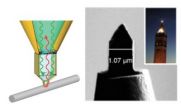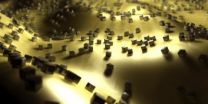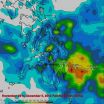(Press-News.org) EVANSTON, Ill. --- With a little practice, one could learn to tell a lie that may be indistinguishable from the truth.
New Northwestern University research shows that lying is more malleable than previously thought, and with a certain amount of training and instruction, the art of deception can be perfected.
People generally take longer and make more mistakes when telling lies than telling the truth, because they are holding two conflicting answers in mind and suppressing the honest response, previous research has shown. Consequently, researchers in the present study investigated whether lying can be trained to be more automatic and less task demanding.
This research could have implications for law enforcement and the administering of lie detector tests to better handle deceptions in more realistic scenarios.
Researchers found that instruction alone significantly reduced reaction times associated with participants' deceptive responses.
They used a control group -- an instruction group in which participants were told to speed up their lies and make fewer errors, but were not given time to prepare their lies -- and a training group, which received training in how to speed up their deceptive responses and were given time to prepare their lies. In the training group that practiced their lies, the differences between deceptive and truthful responses were completely eliminated.
"We found that lying is more malleable and can be changed upon intentional practice," said Xiaoqing Hu, lead author of the study and a doctoral candidate in the department of psychology at Northwestern.
Hu said they were surprised that even in the instruction group, members who were not given time to prepare their lies and told only to try to speed up their responses and make fewer errors were able to significantly reduce their deceptive response reaction time.
"This was really unexpected because it suggests that people can be really flexible, and after they know what is expected from them, they want to avoid being detected," Hu said, noting the findings could help in crime fighting.
"In real life, there's usually a time delay between the crime and interrogation," said Hu. "Most people would have time to prepare and practice their lies prior to the interrogation." However, previous research in deception usually gave participants very little time to prepare their lies.
Lie detector tests most often rely on physiological responses. Therefore, Hu said further research warrants looking at whether additional training could result in physiological changes in addition to inducing behavior changes as observed in their study.
###
"A Repeated Lie Becomes a Truth? The Effect of Intentional Control and Training on Deception" was recently published in Frontiers in Cognitive Science. In addition to Hu, co-authors include Hao Chen and Genyue Fu of Zhejiang Normal University in Jinhua, China.
NORTHWESTERN NEWS: www.northwestern.edu/newscenter/
Deception can be perfected
Can a repeated lie become a truth?
2012-12-07
ELSE PRESS RELEASES FROM THIS DATE:
Gladstone scientists discover novel mechanism by which calorie restriction influences longevity
2012-12-07
SAN FRANCISCO, CA—December 6, 2012—Scientists at the Gladstone Institutes have identified a novel mechanism by which a type of low-carb, low-calorie diet—called a "ketogenic diet"—could delay the effects of aging. This fundamental discovery reveals how such a diet could slow the aging process and may one day allow scientists to better treat or prevent age-related diseases, including heart disease, Alzheimer's disease and many forms of cancer.
As the aging population continues to grow, age-related illnesses have become increasingly common. Already in the United States, ...
Attitudes predict ability to follow post-treatment advice
2012-12-07
SAN ANTONIO, TX (December 6, 2012)—Women are more likely to follow experts' advice on how to reduce their risk of an important side effect of breast cancer surgery—like lymphedema—if they feel confident in their abilities and know how to manage stress, according to new research from Fox Chase Cancer Center to be presented at the 2012 CTRC-AACR San Antonio Breast Cancer Symposium on Saturday, December 8, 2012.
These findings suggest that clinicians must do more than just inform women of the ways they should change their behavior, says Suzanne M. Miller, PhD, Professor ...
Seeing in color at the nanoscale
2012-12-07
If nanoscience were television, we'd be in the 1950s. Although scientists can make and manipulate nanoscale objects with increasingly awesome control, they are limited to black-and-white imagery for examining those objects. Information about nanoscale chemistry and interactions with light—the atomic-microscopy equivalent to color—is tantalizingly out of reach to all but the most persistent researchers.
But that may all change with the introduction of a new microscopy tool from researchers at the Department of Energy (DOE)'s Lawrence Berkeley National Laboratory (Berkeley ...
Notre Dame research reveals migrating Great Lakes salmon carry contaminants upstream
2012-12-07
Be careful what you eat, says University of Notre Dame stream ecologist Gary Lamberti.
If you're catching and eating fish from a Lake Michigan tributary with a strong salmon run, the stream fish — brook trout, brown trout, panfish — may be contaminated by pollutants carried in by the salmon.
Research by Lamberti, professor and chair of biology, and his laboratory has revealed that salmon, as they travel upstream to spawn and die, carry industrial pollutants into Great Lakes streams and tributaries. The research was recently published in the journal Environmental Science ...
Silver nanocubes make super light absorbers
2012-12-07
DURHAM, N.C. -- Microscopic metallic cubes could unleash the enormous potential of metamaterials to absorb light, leading to more efficient and cost-effective large-area absorbers for sensors or solar cells, Duke University researchers have found.
Metamaterials are man-made materials that have properties often absent in natural materials. They are constructed to provide exquisite control over the properties of waves, such as light. Creating these materials for visible light is still a technological challenge that has traditionally been achieved by lithography, in which ...
NASA compiles Typhoon Bopha's Philippines Rainfall totals from space
2012-12-07
NASA's Tropical Rainfall Measuring Mission, or TRMM satellite can estimate rainfall rates from its orbit in space, and its data is also used to compile estimated rainfall totals. NASA just released an image showing those rainfall totals over the Philippines, where severe flooding killed several hundred people. Bopha is now a tropical storm in the South China Sea.
High winds, flooding and landslides from heavy rains with Typhoon Bopha have caused close to 300 deaths in the southern Philippines.
The TRMM satellite's primary mission is the measurement of rainfall in the ...
UC Davis study shows that treadmill testing can predict heart disease in women
2012-12-07
(SACRAMENTO, Calif.) — Although there is a widespread belief among physicians that the exercise treadmill test (ETT) is not reliable in evaluating the heart health of women, UC Davis researchers have found that the test can accurately predict coronary artery disease in women over the age of 65. They also found that two specific electrocardiogram (EKG) indicators of heart stress during an ETT further enhanced its predictive power.
Published in the December issue of The American Journal of Cardiology, the study can help guide cardiologists in making the treadmill test ...
TGen-US Oncology data guides treatment of metastatic triple-negative breast cancer patients
2012-12-07
PHOENIX, Ariz. — Dec. 6, 2012 — Genomic sequencing has revealed therapeutic drug targets for difficult-to-treat, metastatic triple-negative breast cancer (TNBC), according to an unprecedented study by the Translational Genomic Research Institute (TGen) and US Oncology Research.
The study is published by the journal Molecular Cancer Therapeutics and is currently available online.
By sequencing, or spelling out, the billions of letters contained in the genomes of 14 tumors from ethnically diverse metastatic TNBC patients, TGen and US Oncology Research investigators found ...
General thoracic surgeons emerge as leading providers of complex, noncardiac thoracic surgery
2012-12-07
While thoracic surgeons are traditionally known as the experts who perform heart surgeries, a UC Davis study has found that general thoracic surgeons, especially those at academic health centers, perform the vast majority of complex noncardiac operations, including surgeries of the esophagus and lungs.
The authors said their results, published in the October issue of The Annals of Thoracic Surgery, support the designation of general thoracic surgery as a distinct specialty, which will benefit patients when selecting surgeons for specific procedures.
"In years past, ...
Apollo's lunar dust data being restored
2012-12-07
Forty years after the last Apollo spacecraft launched, the science from those missions continues to shape our view of the moon. In one of the latest developments, readings from the Apollo 14 and 15 dust detectors have been restored by scientists with the National Space Science Data Center (NSSDC) at NASA's Goddard Space Flight Center in Greenbelt, Md.
"This is the first look at the fully calibrated, digital dust data from the Apollo 14 and 15 missions," said David Williams, a Goddard scientist and data specialist at NSSDC, NASA's permanent archive for space science mission ...
LAST 30 PRESS RELEASES:
Cost of copper must rise double to meet basic copper needs
A gel for wounds that won’t heal
Iron, carbon, and the art of toxic cleanup
Organic soil amendments work together to help sandy soils hold water longer, study finds
Hidden carbon in mangrove soils may play a larger role in climate regulation than previously thought
Weight-loss wonder pills prompt scrutiny of key ingredient
Nonprofit leader Diane Dodge to receive 2026 Penn Nursing Renfield Foundation Award for Global Women’s Health
Maternal smoking during pregnancy may be linked to higher blood pressure in children, NIH study finds
New Lund model aims to shorten the path to life-saving cell and gene therapies
Researchers create ultra-stretchable, liquid-repellent materials via laser ablation
Combining AI with OCT shows potential for detecting lipid-rich plaques in coronary arteries
SeaCast revolutionizes Mediterranean Sea forecasting with AI-powered speed and accuracy
JMIR Publications’ JMIR Bioinformatics and Biotechnology invites submissions on Bridging Data, AI, and Innovation to Transform Health
Honey bees navigate more precisely than previously thought
Air pollution may directly contribute to Alzheimer’s disease
Study finds early imaging after pediatric UTIs may do more harm than good
UC San Diego Health joins national research for maternal-fetal care
New biomarker predicts chemotherapy response in triple-negative breast cancer
Treatment algorithms featured in Brain Trauma Foundation’s update of guidelines for care of patients with penetrating traumatic brain injury
Over 40% of musicians experience tinnitus; hearing loss and hyperacusis also significantly elevated
Artificial intelligence predicts colorectal cancer risk in ulcerative colitis patients
Mayo Clinic installs first magnetic nanoparticle hyperthermia system for cancer research in the US
Calibr-Skaggs and Kainomyx launch collaboration to pioneer novel malaria treatments
JAX-NYSCF Collaborative and GSK announce collaboration to advance translational models for neurodegenerative disease research
Classifying pediatric brain tumors by liquid biopsy using artificial intelligence
Insilico Medicine initiates AI driven collaboration with leading global cancer center to identify novel targets for gastroesophageal cancers
Immunotherapy plus chemotherapy before surgery shows promise for pancreatic cancer
A “smart fluid” you can reconfigure with temperature
New research suggests myopia is driven by how we use our eyes indoors
Scientists develop first-of-its-kind antibody to block Epstein Barr virus
[Press-News.org] Deception can be perfectedCan a repeated lie become a truth?




